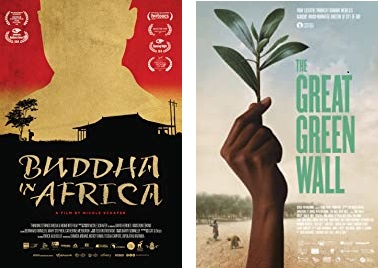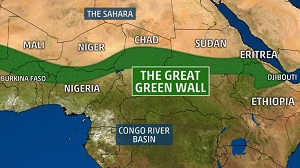We Love Foreign Feature Films
Vancouver Foreign Film Society

Comparative Review “Buddha in Africa” and “The Great Green Wall”
Both films screened at the 2019 Vancouver International Film Festival.
My review as an ex South African living in Vancouver and returning to my land of birth frequently is based primarily on a political commentary rather than of the films themselves.
Both are strong documentaries with many unanswered questions for viewers on why Africa struggles to survive? A continent that is so diversified, beautiful and rich in so many ways; yet torn by wars, corruption, starvation, migration and past and current colonization.
Who is to blame? Which path will lead to a better future?
Review for our South African followers and and African Interests

Buddha in Africa – South African Documentary
This film screened at Hot Docs and while made in South Africa it is really about the colonization of Africa today.
- Filmed in Malawi it deals with the difficult subject matter of Chinese involvement in Africa today, which is not that different from the past exploration and profiteering that took place in Africa and other parts of the world some decades ago.
- The film covers the influence and exploitation by a Taiwanese Buddhist Organization (Probably they could not operate in the People’s Republic of China) of Malawi orphans who are taken in and while provided with education and food and are forced to subscribe to strict Buddhist beliefs.
- These orphans living mostly with grandparents because of aids, war and many other issues facing countries in Africa are educated in Mandarin and trained in Kung Fu.
- Some of the more capable students are then offered scholarships in Taiwan and taken to wealthier countries to be exploited as circus performers to raise money from prospective donors so that this Buddhist organization can expand their influence in southern and other parts of Africa.
- The conflict of losing their own cultures and family traditions and beliefs are tragic in their consequence, particularly as the students grow older and question their identities and Buddhist beliefs, and the choices they have to make as adult orphans.
- Especially with no or little opportunities in their own countries.
- While the film is light on some details the film does give the audience a real taste of what is happening in Africa today with exploitation and modern day colonization.

The Great Green Wall .- Senegal Documentary
This recent film in contrast to the colonization of Africa creates a possibility of hope for Africa and its inhabitants particularly in the desertification of the areas just below the Sahara desert stretching from Senegal on the West to Ethiopia on the East.
- Started by the pan-national African Union it was hoped this ambitious project of creating a Great Green Wall of reforestation over this vast area, would combat the effects of climate change and the environment, and that this crisis could be reversed by creating an area that once again could be be cultivated and farmed.
- Accompanied by renowned African musicians such as Didier Awadi, Songhoy Blues, Waje and Betty G, Malian musician and activist Inna Modja the film creates a musical journey through Senegal, Mali, Nigeria, Niger, and Ethiopia, meeting those dedicated to make this project a success, and those that have already made some success such as in Ethiopia.
- Inna also interviewed many who have tried to emigrate to Europe and failed, as well as those who have suffered through attacks of kidnapping, capture and other atrocities from rebel conflicts.
- There is also those who fear they will once again suffer from famine, that was so devastating in Ethiopia previously and that no-one wants to talk about!
- This project was inspired by Thomas Sankara, the revolutionary who became president of Burkina Faso in the ‘80s, before he was tragically assassinated.
- While the project is still very much in its infancy, there is hope that with UN assistance this great dream can become a reality and Africans can rebuild Africa without colonization or fleeing as refugees or otherwise dying from starvation.
- A hope for a a future created by Africans for themselves and their countries?
- Unfortunately many of the funds pledged at the UN have not actually been realized!
